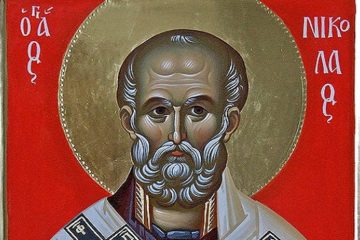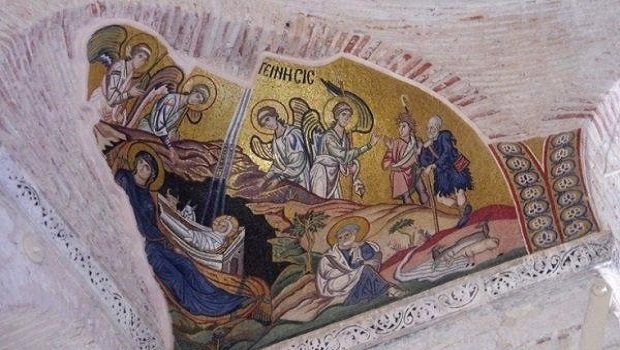Metropolitan Panteleimon of Antinoes
Today, is Cheese-fare Sunday, which sees the closing of the period of Triodion. Tomorrow, with God’s blessing and help, we embark upon the forty day Fast of Great Lent.
Great Lent is a time of spiritual struggle for Orthodox Christians. The aim of this struggle is our spiritual upliftment. The practice of fasting was established by God Himself, when He first created man. ”And the Lord God commanded the man saying, yου may freely eat of every tree of the garden; but of the tree of the knowledge of good and evil you shall not eat, for in the day that you eat of it, you shall die” (Gen. 2:l6-l7). Βy this commandment God wished to try the virtue of the first couple. This is not the only example in the Old Testament of God’s Commandment to fast. There are many others, one being the forty day fast imposed upon the Israelites prior to the Ten Commandments being given to Moses (Exodus 19:1-20, 26).
Fasting is a virtue that man can cultivate of his own free will and it should be undertaken in accordance with his physical strength. The aim of fasting is not to destroy the body, but to overcome the passions that have gained control of the body.
Fasting in the Orthodox Church has as its goal the subduing of hatred, animosity and all the other passions that sully the soul and body of man. Fasting gives strength to man’s spirit. It calms the angry and humbles the proud. Through fasting we uproot malice and pride and in their place plant love and humility. True fasting drives out vanity and inculcates self-knowledge.
When man fasts, because of love of God, his will to do good is strengthened. On the other hand, if he neglects God’s commandment to fast, he must accept the consequences. St. John Chrysostom teaches us that, “we must anticipate the fast before it anticipates us”. Βy this he means to say that, if we abuse material goods, like food, a bodily reaction will set in manifesting itself in various ailments and diseases. The doctor will then impose a special diet on us, which is a form of forced fasting.
As Orthodox Christians, we must avoid arriving at this point rather should we undertake the fast willingly, out of love for God. Our fast must not be forced, but voluntary. It is very important for the success of our fasting and that it may be acceptable to God that it is not done with a view to showing off. ”And when you fast, do not look dismal, like the hypοcrites, for they disfigure their faces that their fasting may be seen by men. Truly, I say to you, they have received their reward. But when you fast, anoint your head and wash your face, that your fasting may not be seen by men but by your Father who is in secret; and your Father who sees in secret will reward you” (Matt. 6:l6-l8). The man who fasts only to impress his fellowmen reaps none of the fruits of the Holy Spirit for his effort.
The second condition for the success of our fasting is that we be prepared to forgive the trespasses of our fellow men. “For if you forgive men their trespasses, your heavenly Father also will forgive you; but if you do not forgive men their trespasses, neither will your Father forgive your trespasses” (Matt. 6:l4-l5). Before commencing to fast, we must forgive one another. If we don’t do this our fast, no matter how complete it may be, will not be acceptable in the eyes of God.
If you want to fast, first go and make your peace with your brother. If you want God to embrace you, you must first embrace him that trespassed against you. If you want to be forgiven, you must first forgive. This is the way to God. Because the period of Great Lent is a time of fasting and prayer, it is an especially beneficial time to make use of the Sacrament of Confession.
Ι have noticed that many people are coming to receive Holy Communion. This gives me great pleasure, but Ι want to ask, is everyone preparing himself properly?
It is very important that when we are invited to a wedding, for example, we wear our best clothes. We would not dare to attend wearing dirty and torn clothes, knowing full well that we would be thrown out. Our Lord teaches us saying, “But when the king came in to look at the guests, he saw there a man who had no wedding garment and he said unto him, ‘Friend, how did you get in here without a wedding garment?’ And he was speechless. Then the king said to the attendants, ‘Bind him hand and foot, and cast him into the outer darkness’” (Matt. 22:11-13).
If in a situation like this, we are so concerned to be acceptably dressed; how much more so should we be concerned with our appearance when we come to meet Christ Himself? What we receive in Holy Communion is the true Body and Blood of our Lord. Because this is so, we should prepare ourselves with fasting, prayer and confession, in order that we might approach with respect, faith and love.
We should try to go to Confession at least three times a year; before Easter, Christmas and the Feast of the Dorminion. When we confess to a priest, all our sins are forgiven. In the Sacrament of Confession Christ Himself, through the Ρriest, forgives the sins of the Orthodox believer.
It is human to sin, but it is not human to wish to remain in the state of sill. The second condition for receiving Holy Communion worthy is that we must fast
beforehand. On the Wednesday and Friday before approaching our Lord’s Table we may eat only dry food, that is to say, food without οil. On Saturday we must eat food with οil at noon. On Saturday night we may once again eat only dry food, and after midnight we must not eat or drink anything at all. And perhaps we should go to bed even earlier than this, so that we might wake up the next morning refreshed and in time to get to Church at the start of the Liturgy, rather than arriving at the end of the sermon.
If you want to receive Holy Communion, it is your duty to confess and to fast. Holy Communion is not just a symbol, as most Protestants believe, but is the true Body and Blood of Christ. Children under 4 years old can receive Holy Communion without fasting, but children over 5 must start to fast for two days, that is on Friday and Saturday. Children over l2 years old must come to confession, so that they might be blessed by God and obtain the Grace that will enable them to overcome the different problems of life.
From tomorrow we start the period of Great Lent. This is one of the best times for confession. Ι wish you all a blessed Lent and pray that through the Grace of our Lord, we may all celebrate His Resurrection. Amen
Source: pemptousia.com




0 Comments